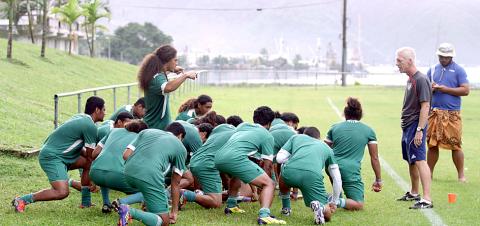As the world’s top soccer nations prepare for the FIFA World Cup next month, a new documentary celebrates how the sport’s worst team, American Samoa, bounced back from a record 31-0 defeat.
The film, Next Goal Wins, tells how an unlikely squad that included soccer’s first transgender player, a psychologically scarred goalkeeper and a chain-smoking Dutch coach restored the tiny Pacific nation’s pride in the game after their 2001 humiliation against Australia.
When London-based filmmaker Mike Brett began work on the project in 2011, the American Samoan side had languished at the bottom of the FIFA rankings for their entire 17-year existence, losing all of the 30-plus matches they contested.

Photo: AFP / “Next Goal Wins”
The low point was their 31-0 loss to the Socceroos in 2001, when striker Archie Thompson contributed 13 goals to the most lop-sided scoreline ever recorded in an international match.
Nevertheless, American Samoa kept turning up at tournaments, even as their roll of shame lengthened after defeats such as their 11-0 loss to Fiji in 2004, 15-0 to Vanuatu in 2007 and 12-1 to the Solomon Islands the same year.
Brett and co-director Steve Jamison became intrigued by the Pacific amateurs who kept coming back, despite the heavy losses and scorn poured on them.
“That 31-0 result is like the punchline to a joke or the answer to a pub trivia question,” Brett said. “We wanted to go behind the headlines and tell the human story.”
Brett and Jamison were keen amateur players that ended up filming advertisements for sports brands such as Nike and Adidas. After working with top clubs like Barcelona and Arsenal, Brett said they became jaded as the commercial side of the game lost its luster.
“We slightly fell out of love with the game that we remembered from when we were kids and when this came along it was an opportunity to really go back to our roots,” he said.
To do this they first had to persuade American Samoa that they were not planning a mockumentary that would take cheap shots at the team’s already wounded pride.
“We had to explain to them that we weren’t looking to take the mickey,” Brett said. “We were genuinely in awe of these guys, who were clearly in love with the game so much that they’d play for 17 years straight without winning a single match. It says something about the purity of their commitment to the game and their utter unwillingness to give up, even in the face of defeat after defeat.”
Once they had gained the team’s trust, the filmmakers got to know a fascinating group of individuals desperate for redemption on the pitch. Among them was defender Jaiyah Saelua, who was born John Saelua and recognized by FIFA as the first transgender player in international soccer.
Saelua is a fa’afafine, part of a Polynesian tradition which — in her words — recognizes that someone born male can have a woman’s spirit. A transgender player may attract prejudice in some teams, but Saelua’s teammates who grew up with fa’afafine treated her like any other player.
“I’m just a soccer player, even though I run like a girl,” she says in the movie. “I’m not a male or a female, I’m a soccer player.”
Then there is Nicky Salapu, the goalkeeper traumatized by the 31-0 defeat, who said he woke up at night a decade later reliving the experience of picking the ball from the back of his net time after time.
Other squad members include overweight midfielder Rambo and a player who smokes in training.
The coach charged with bringing the disparate group together was Dutchman Thomas Rongen, a gravel-voiced maverick whose tough approach initially alienated the easygoing Samoans.
The film follows their fortunes as they struggle to find form, culminating in the country’s first-ever win against Tonga in late 2011.
Brett said American Samoa’s never-say-die attitude rekindled his love of the sport and players such as former England defender Graeme Le Saux reacted in a similar manner after seeing the documentary.
With the World Cup around the corner, he said the film, which is to be screened at the Sydney Film Festival next month, was a reminder of the simple joys of soccer and sport in general.
“People want us to say: ‘Oh, look at all these horrible football millionaires, aren’t they terrible people and aren’t these poor Samoans great,’” he said. “That’s pretty patronizing both to the Samoans and the pros. Most of the professionals dearly love the game, but they’re in a highly pressured environment where it can be easy to lose sight of that.”
America Samoa are ranked 197th in the world, 10 places from the bottom of the FIFA rankings. Taiwan are ranked 170th.
Additional reporting by staff writer

Tallon Griekspoor on Friday stunned top seed Alexander Zverev 4-6, 7-6 (7/5), 7-6 (7/4) in the second round at Indian Wells, avenging a devastating loss to the German at Roland Garros last year. Zverev, the world No. 2 who is heading the field of the prestigious ATP Masters event with No. 1 Jannik Sinner serving a three-month drugs ban, is the first Indian Wells men’s top seed to lose his opening match since Andy Murray in 2017. It was a cherished win for Griekspoor, who had lost five straight matches — including four last year — to the German. That included a five-setter

Donovan Mitchell on Wednesday scored 26 points as the Cleveland Cavaliers punched their ticket to the NBA playoffs with a hard-fought 112-107 victory over the Miami Heat. A seesaw battle in Cleveland saw the Heat threaten to end the Cavs’ 11-game unbeaten streak after opening up a seven-point lead late in the fourth quarter, but the Cavs clawed back the deficit in the closing minutes to seal their 12th straight victory and a place in the post-season. The Cavaliers improved to 52-10, maintaining their stranglehold on the Eastern Conference with 20 games of the regular season remaining. Mitchell was one of six Cleveland

VALUABLE POINT: Relegation-threatened Valencia snatched a thrilling 3-3 draw at CA Osasuna thanks to a remarkable backheel volley by Umar Sadiq Barcelona on Sunday secured a comfortable 4-0 win over Real Sociedad to move back top of La Liga. Aritz Elustondo’s early red card gave Hansi Flick’s side a comfortable afternoon, with Gerard Martin, Marc Casado, Ronald Araujo and Robert Lewandowski on the score sheet. Atletico Madrid beat Athletic Bilbao on Saturday to temporarily knock the Catalans from their perch, while Real Madrid, third, lost at Real Betis Balompie. Flick was able to rotate his side a little ahead of the UEFA Champions League round-of-16 visit to face SL Benfica tomorrow and still move one point above Atletico. “There were a lot of things that

Steve Smith yesterday announced his retirement from one-day international (ODI) cricket after captaining Australia to a semi-final exit at the ICC Champions Trophy, bringing down the curtain on a career in the format that included two ICC World Cup wins. The 35-year-old batsman, who was his team’s top scorer with 73 as Australia lost to India by four wickets in Dubai on Tuesday, said he would still be available for selection for T20 internationals and Test matches. “It has been a great ride and I have loved every minute of it,” Smith said in a Cricket Australia statement. “There have been so